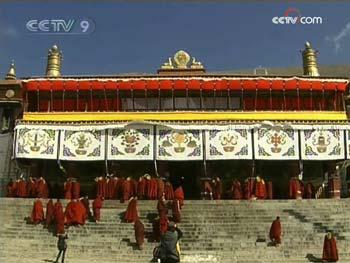This year marks the fiftieth anniversary of democratic reform in the Tibet Autonomous Region. At the Drepung Monastery in Lhasa, many monks say learning the region's past has given them a true understanding of the huge changes that have taken place in Tibet.

Monks at the Drepung Monastery are discussing the Tibet of 50 years ago. Many say studying the White Paper on Democratic Reform gives them a better understanding of the history. The reform abolished the harsh feudal serfdom regime and freed some one million serfs, or 90 percent of the Tibetan population then.
42-year old Ngawang Choedrag says what impressed him most is that the democratic reform has greatly improved the lives for countless Tibetans, including ordinary monks.
Ngawang Choedrag from Drepung Monastery said, "I've got a better understanding of life in the old Tibet and the huge development of our society today. Before the democratic reform, lives of ordinary monks at monasteries were extremely hard. They never got enough to eat. But our lives have improved substantially. We never have to worry about things like eating."
Drepung is one of the Big Three Monasteries in Lhasa. The 600-year-old monastery is also the largest one of the Gelugpa Sect of Tibetan Buddhism. A year after the March 14th riots last year, Buddhist activities have returned to normal.